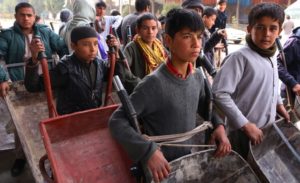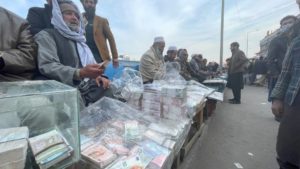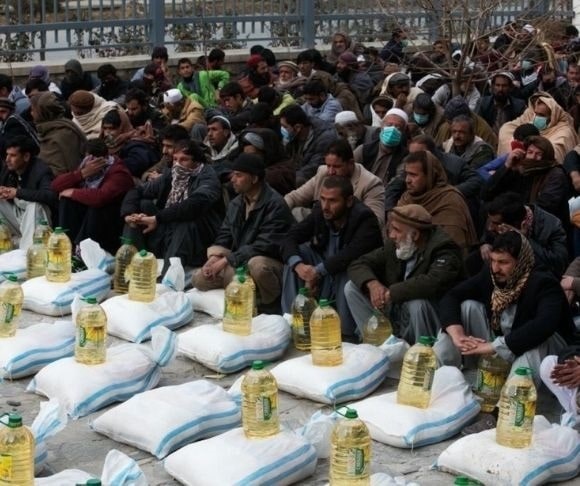It’s only been four months – less than 120 days – since U.S. troops left Afghanistan and the Taliban took over. What has befallen the people of that nation since then? Starvation, inflation, extrajudicial killings.
Starvation and Drought

(Photo by Bilal Guler/Anadolu Agency via Getty Images)
The U.N.’s World Food Programme (WFP) reported on December 14 that it is estimated that 98% of Afghans are not eating enough. Seven in ten families have had to resort to borrowing food, driving them even deeper in debt, the agency said. WFP has already provided food assistance to 15 million people in the region this year, and seven million just in November. “We cannot waste any moment,” warned Tomson Phiri, global spokesperson for the WFP. “Our country director describes the situation as quite dire. She says it’s ‘an avalanche of hunger and destitution.”
According to the Islamic Relief fundraising page: “Some Afghan women are going days without food as the country’s hunger crisis worsens by the day.” Current projections, according to the organization, show that within one year 97% of Afghans will be in poverty and currently more than eight million people are barely above famine level. The statistics get worse: three million children under the age of five are expected to suffer from malnutrition, and one million of these children are at risk of dying.
Mohammed Hamid Sattai, Islamic Relief’s Humanitarian Program Coordinator, explained:
“Women often eat last and least anyway in poor families, but when food is scarce women will take less and less food and in some cases will have no food at all. When there is no meal for the mother, then there is even less for the children and this causes long-term health complications. The ongoing uncertainty means that most crucial aid efforts remain frozen even as the needs are growing. If urgent action isn’t taken soon to get food to those in need, we will see a flood of anaemic [sic] mothers and severely malnourished children.
“We are already seeing people so desperate that they are asking shops to give them leftover leaves from vegetables that they don’t normally sell and picking flowers to make thin soups.”
The region is also experiencing the worst drought in 27 years, making it even more difficult to grow and sell crops.
Inflation Adds to Poverty and Hunger

Exchange market in Kabul (Photo by Bilal Guler/Anadolu Agency via Getty Images)
Just this week, the afghani lost nearly 12% of its value against the dollar in just a few short hours. As Reuters reported, “The abrupt withdrawal of foreign aid following the Taliban victory in August has left Afghanistan’s fragile economy on the brink of collapse, with prices for food, fuel and other basic staples rising rapidly out of reach for many.”
American dollars that used to be shipped to the country are virtually non-existent now. The Afghanistan banking system is only partially funded, and fear of U.S. sanctions has cut them off from the world financial system. About $9 billion in central bank reserves remain blocked outside the country, Reuters reported. Internationally, country leaders are hesitant to send cash to the starving country for fear the funds will wind up in the Taliban’s hands.
The unemployment rate in Afghanistan is high, at approximately 11.16% in 2020. Many people are working 12 or more hours a day just to be able to buy food. Others have been waiting months for paychecks as companies struggle. In just one week, wholesalers reported that the price of a sack of flour (110 lbs) had risen by 20-40%, costing between 2,800 – 3,200 afghani. The week before, the same product cost 2,300 afghanis. The price of sugar is up by a third and rice now costs 15% more than it did days ago. Furthermore, as Reuters pointed out:
“The crisis has accelerated sharply in recent days. On Monday [Dec. 13] the afghani, which traded at around 77 to the dollar before the fall of Kabul and at 97 a week ago, dropped from 112 to the dollar in the morning at Kabul’s Sarai Shazada money market to 125 by the afternoon.”
The situation has caused even more dire circumstances with children being pressed into labor or even “sold.”
Extrajudicial Killings and Other Horrors
Since the Taliban took over in August, more than 100 former Afghan national security forces and others have been killed by the Islamist group, which has also been recruiting child soldiers and quashing women’s rights, according to the U.N.’s announcement on Dec. 14. U.N. Deputy High Commissioner for Human Rights Nada al-Nashif said that at least 50 suspected members of ISIS-Khorasan (an opponent of the Taliban) have died by hanging or beheading.
Of the 100 alleged killings, at least 72 are attributed to the Taliban, al-Nashif explained, adding:
“In several cases, the bodies were publicly displayed. This has exacerbated fear among the sizeable category of the population.”
During a speech to the Human Rights Council, al-Nashif said the Taliban rule was marked by extrajudicial killings and restrictions on women’s and girls’ basic rights, Reuters wrote. Child labor and early marriages, “even the sale of children,” is on the rise. The commissioner said that at least eight Afghan activists and two journalists have been killed since the withdrawal of U.S. troops, and the U.N. has documented 59 unlawful detentions. “The safety of Afghan judges, prosecutors, and lawyers – particularly women legal professionals – is a matter for particular alarm,” she warned.
Nasir Ahmad Andisha, Kabul’s U.N. ambassador to the United Nations in Geneva, said:
“With the military takeover of Kabul by the Taliban, not only we see a total reversal of two decades of advances…but the group is also committing a litany of abuses with full impunity which in many cases is going unreported and undocumented.”
[memberzone align=”right”] In addition, the ambassador said that “credible reports have testified accounts of ethnic and tribal purging in several provinces of the country.”
President Joe Biden has received heavy criticism for pulling troops out of Afghanistan the way he did. Now, less than 120 days since that fateful day, Afghans have gone back in time, ruled by the Taliban and suffering starvation, killings, inflation, and repression of women’s rights. It is ironic that the Biden administration has claimed to be all about human rights, and even just held a Democracy Summit called “Official Interventions” in which several country leaders were invited to explain their vision for pushing Democracy while bettering human rights and expanding civic space while this is going on in Afghanistan.
~ Read more from Kelli Ballard.




